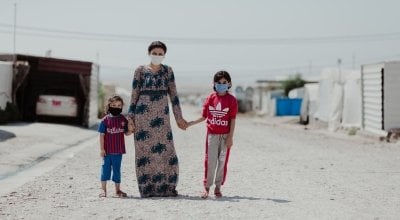
Knowledge Hub
Lebanon – the small country home to a million refugees

We have been working in northern Lebanon since 2013, in response to the massive influx of refugees into the country, fleeing conflict in Syria.
Lebanon has the highest per capita refugee population in the world, at a time hosting over 1 million refugees, almost all of them fleeing the Syrian conflict. Currently, 865,300 refugees hosted in Lebanon are Syrian (an additional 4,000 are from Iraq), but given the size and relatively small population of the country, that still means one refugee for every four Lebanese nationals.
Those who manage to reach safety in Lebanon have a huge range of needs – first and foremost they are in need of safety, food and healthcare, but they also need documentation, education for their children, and a means to earn a living too. People are often traumatised, having witnessed family members being killed and enduring long and dangerous journeys to get to Lebanon. Both adults and children are often in need of psychosocial support.
A roof over their head

The socio-economic downturn coupled with the Covid-19 pandemic and Beirut blast have all contributed to nine out of ten Syrian refugees living in extreme poverty.
Most Syrian refugees in Lebanon live in residential buildings which are overcrowded and in poor condition. Lebanon experiences sweltering hot summers, but in winter, temperatures are often below zero. Many refugees are forced to live in buildings without proper insulation, without doors or windows, and without adequate protection from the harsh sun during summer. And as most Syrian refugees don’t have an income, they are unable to pay rent.
In response to this, Concern has worked to negotiate rent-free, rent-freeze and rent reduction agreements with landlords for Syrian tenants for periods of one year and longer, in exchange for support to rehabilitate their properties and make them habitable. Concern have also provided weatherproofing and insulation kits and provided mobility aid kits for elderly and disabled refugees. In addition, we also ensure refugees living in temporary Informal Tented Settlements (ITS) are provided with clean water and sanitation facilities, which helps to keep people healthy and decreases the risk of disease.
A way to make a living
Most people want to be able to look after themselves, make a living, and pay their own way, and the Syrian refugees in Lebanon are no different. However, it is extremely difficult for refugees to get any paid work and access to the labour market is hugely restricted as a result of residency regulations put in place for Syrians in January 2015. Over 80% of Syrian refugees currently lack valid residence permits (legal status) in Lebanon.
Concern has been supporting people to grow their own food and providing them with gardening kits and training to work as farm labourers in the host community. We are also providing business training, support to small businesses and income generation. This also benefits the host communities and the local cooperatives.

*Khadija, who arrived in Lebanon in 2013, was helped by Concern to work at a local cooperative, where she learned how to make different types of cheese which are sold locally. And *Maria, who when she arrived in Lebanon, says, “financially we were at zero,” signed up for a cash for work scheme organised by Concern Worldwide Livelihood team. *Maria gained carpentry skills and learned how to make a chicken coop. As well as having steady supply of eggs, if anything in her tent breaks, she now has the skills to fix it herself.


Concern also works to support refugees to develop positive coping strategies, prevent gender-based violence, undertake child protection and provide psychosocial support. In 2019, 2,261 adults and children benefited from Engaging Men and Women and psychosocial-support sessions and as of June 2020, Concern’s Covid-19 response reached 3,098 individuals through awareness-raising sessions and distribution of hygiene kits.
As well as working with refugees in Lebanon, Concern works with displaced people within Syria, and with Syrian refugees in Turkey. We also work with refugees and displaced people in South Sudan, the Democratic Republic of Congo and Bangladesh.






